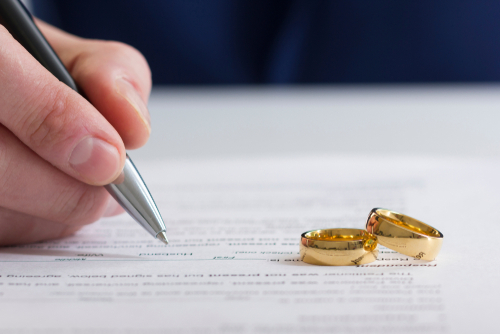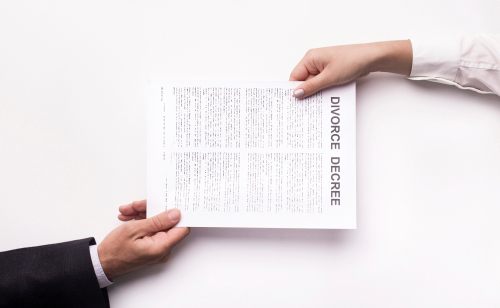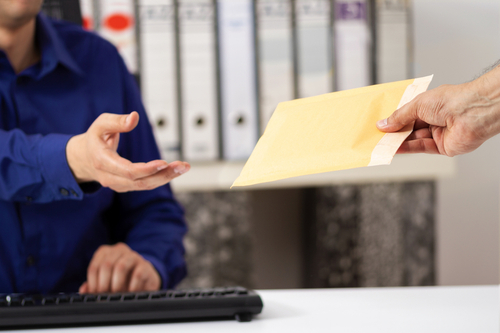Divorce is seldom easy, although the process of filing for divorce can be relatively simple in the UK. Frequently, it is at the point of serving the divorce papers that a couple’s situation can develop complications. So, how are divorce papers served in the UK?
Reasons for separation can be complex. If communications with a spouse are not amicable, the person filing for divorce may be afraid to approach their partner directly for fear of emotional strain or abuse. They may also have issues with tracking a spouse who is absent. Whatever the reason, some make the choice to hire a process server for their divorce papers to simplify the situation and provide some peace of mind during a stressful time.
The Divorce process in the UK
For your divorce to be legal in the UK, you must comply with this process.
- Firstly, you must file a divorce petition with a recognised divorce centre in your region. In your divorce petition, you’ll need to include the reason for your separation.
- You must serve your spouse the divorce papers which outline the terms of the separation. Understandably, this is where things have the potential to become more complicated. There may be issues regarding paper serving for a number of reasons, especially if your spouse is unwilling to separate. At this point, some may find it useful to involve a process server to resolve this issue and continue with the divorce.
- Once you’ve completed the D8 divorce petition, the next step is the acknowledgement of service. This is a form that confirms your spouse has received the papers and acknowledges the divorce. Your Partner must note they’ve received divorce papers, that they agree with the terms and reasoning of the divorce, and confirm if they accept the divorce, or if they want to contest it.
This must be done within 7 days, and if not completed, the court won’t follow up with your partner. If necessary, this is a point where a court bailiff or process server can be hired to personally present the divorce petition to the respondent party. It’s essential this happens for the divorce to continue.
- Once this is complete, you’ll to apply for a divorce decree. The steps are:
Application for Conditional order
This is a first decree separation, which means there is no identifiable reason why the courts can’t grant you a divorce. If this is ruled by the judge, the Conditional Order (previously known as a Decree Nisi) will be applied and a pronouncement date set. Once you have this, you’ll be able to apply for the final decree 6 weeks following that date
Once you have a pronouncement date you can apply for the final decree 6 weeks and 1 day after the date given by the court.
Application for Final Order
This is the final step in your divorce process and will usually take around 2 weeks to apply and legally come into effect. You must apply for the final order (previously known as a decree absolute) which is what legally finalises your separation.
As previously said, the application for the order can’t be done sooner than 6 weeks after the pronouncement of your conditional order.
Financial settlements.
Any agreements you may have made with your spouse regarding your finances or property should be put into documentation by a family law solicitor in order to create an agreed financial settlement. We recommend taking legal advice on any settlement agreements.
If your marriage was short or without joint assets or children, this may be simple to reach an agreement on. If this is the case, you may be able to apply a clean break order which works to block any future claims to finances made by either side.
How Are Divorce Papers Served in the UK?
How long after filing for divorce are papers served in the UK?
Once you’ve sent off an application for a divorce, you’ll be sent a notice that your application has been received. If you applied online, this can take up to 10 days, but if by post, it can be up to a month.
The court will send your spouse the divorce application along with an Acknowledgement of Service form. This outlines if they agree to the divorce, and they have 8 days to respond.
These papers can either be an application for divorce or alternatively, a dissolution of a civil partnership.
Who can legally serve divorce papers in the UK?
Your primary method of having your divorce papers served in the UK will preferably be yourself handing over the documents in person to your spouse to ensure they are received. You must show that you have used due diligence and have done everything reasonable to serve the documents. Of course, this is not always viable, especially if you believe you’re at risk of being harmed. You might also have difficulty tracking down your spouse if they don’t want to be found.
In situations such as this, it’s acceptable to involve a third-party substitute service to ensure the papers are received.
Process Servers are permitted to provide a tracking service to locate a missing partner, saving you valuable time and effort during a time of high emotional stress. They have access to a range of useful tools and data that can help you sort the issue effectively and professionally. Once located, the server will then present the divorce papers and ensure they are legitimately received, and the process can be continued.
If you want to avoid spending a great deal of time and energy locating the recipient or trying to create substitute services, a process server is a must. A process server can basically do all of this work for you – all you have to do is provide them with as much information as possible to enable them to serve your documents.

How can a process server deliver divorce papers?
Firstly, if a tracking service is needed, a process server can employ their investigative skills to locate your partner. There are a few ways this can be done.
Any information you can provide will be a help. This might be a photograph of their appearance, their last known address, their place of work, or any other locations they might frequent such as a gym. The server may also use social media for any useful information that can help; status updates and photos can provide insight into locations and movements if your spouse’s address isn’t known.
If the address is identifiable, your server can also undertake surveillance. If your spouse isn’t answering the door, the server may discreetly and professionally wait for an opportunity to approach, such as when they return home from work. This must be done with subtlety to ensure there isn’t the chance for a disappearing act.
Can the divorce papers be served at work?
Yes.
If a residential address isn’t feasible, the divorce papers can be sent to a spouse’s place of work if it’s known that they are still employed there. However, you may want to use subtlety or caution depending on the nature of the place of work. It’s also a good idea to confirm the papers are assured to be passed to your spouse and without delay.
Can the divorce papers be served by email?
Can you serve divorce papers by email? Essentially, no. Family Procedure Rules outline that divorce papers cannot be served through email or fax as they cannot physically confirm that they have been received by the spouse. The respondent should complete an Acknowledgement of Service divorce form to evidence they are aware of the divorce proceedings and agree to them. They can then return the acknowledgement to the court.
However, if you have ‘good reason’ to do so, you can appeal to the Court to be granted an alternative method of serving papers if you have no address to send to. This can include an email if your spouse acknowledges in writing that they have received the papers.
How much does it cost to have your divorce papers served in the UK?
On average in the UK, the cost of hiring a process server will be between £100-£200. This will be a standalone fee without the usual hourly charges of a solicitor. You should always carefully consider the server you choose, as some of the cheaper options may not provide enough investigative efforts to complete the serving. Before hiring, it’s best to ask what your fee is including.
Why choose Able Investigations as your Process Servers?
Able Investigations are an experienced and highly professional team. If you require a process server to serve legal papers or court orders on your behalf, Able Investigations can help. We have an excellent track record for process serving and operate within 24 hours to ensure it is done correctly.
Our UK process serving has a fixed fee of £125.00 + VAT. This includes three visits to deliver the papers and our expert investigative services. A discount of 25% is also offered on all volume work, this being anything over 10 cases a week.
We serve all documents personally (where possible) so we can guarantee that only a Certificated Enforcement Officer from our company will attend to serve the papers.
In addition to this, we offer;
• Out of hours process serving – all visits to a private address will include at least one visit outside of normal working hours, unless otherwise specified by the client
• Experienced support team – with many years’ experience in the legal sector, our support team are always on hand to answer any queries, update you on your case or to discuss specific issues
• Professional Certificates, Statements and Affidavits – once papers have been served you will receive a statement or Affidavit of Service, depending on the type of document served. In over twenty years, we have never had a case thrown out of court because of our statements.
• High-quality service, evidenced by our ISO:9001 accreditation and our MD as President of the Association of Certificated Enforcement Agents
For more information on process serving please call one of our team on 0345 366 0000 or use our contact form.





Comments are closed.